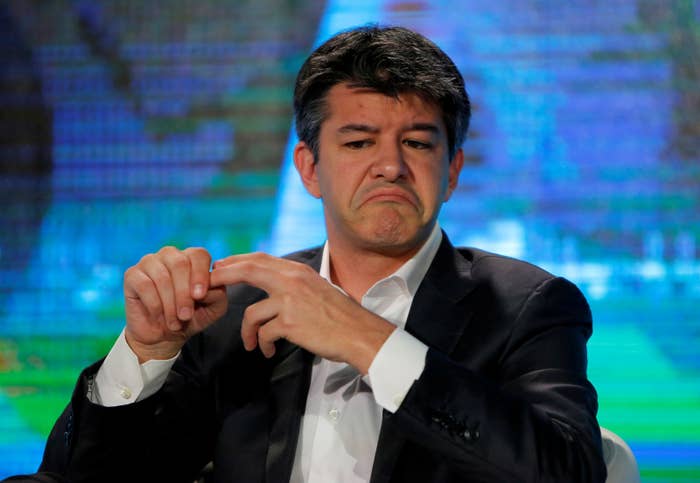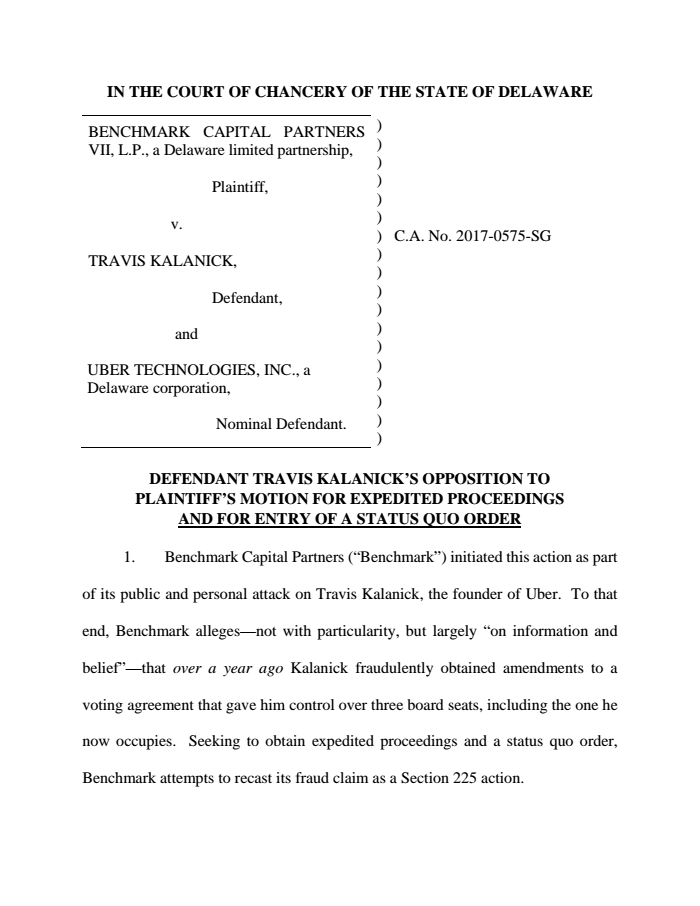
Uber cofounder and former chief executive Travis Kalanick submitted court filings on Thursday arguing that the unprecedented investor lawsuit brought against him last week is part of a personal attack. Kalanick’s filing said Benchmark Capital had the information in its lawsuit, which accuses him of fraud, breach of contract, and breach of fiduciary duty, over a year ago.
In responding to the suit brought by Benchmark, a San Francisco-based venture capital firm and one of Uber’s largest shareholders, Kalanick’s legal team said that the Delaware Chancery Court "lacks subject matter jurisdiction" in the case, arguing that "Benchmark's claims are subject to mandatory arbitration."
Kalanick, who resigned as CEO of the ride-hailing company in June after a series of sexual harassment scandals and reports of executive misbehavior, still sits on its board. Benchmark, which filed its lawsuit last week, also controls a board seat.
"Benchmark Capital Partners initiated this action as part of its public and personal attack on Travis Kalanick, the founder of Uber,” the filing said. "[Benchmark] executed its plan at the most shameful of times: immediately after Kalanick experienced a horrible personal tragedy."
The filing outlined how Kalanick was the subject of an alleged “ambush” by Benchmark Capital just a week and a half after his mother was killed in a boating accident. It said Benchmark Capital members “handed Kalanick a draft resignation letter, and told him he had hours to sign it, or else Benchmark would start a public campaign against him.”
The legal battle playing out in Uber’s boardroom is just the latest sign of dysfunction at the $69 billion company, which has been plagued by a crisis of leadership, complaints about its grinding work culture, and several other high-profile lawsuits. In its suit, Benchmark accused Kalanick of fraud and breach of fiduciary duty for not informing the board of problems at Uber and developing a board power structure that would maintain his influence in case he was removed as CEO. Benchmark also said that Kalanick is interfering in the company’s search for a new chief executive.
A spokesperson for Benchmark declined to comment on Kalanick’s response and referred BuzzFeed News to an earlier statement.
“Resorting to litigation was an extremely difficult step for Benchmark,” read the statement. “Failing to act now would mean endorsing behavior that is utterly unacceptable in any company, let alone a company of Uber's size and importance.”
In its lawsuit, Benchmark alleges that Kalanick deliberately concealed "gross mismanagement and other misconduct" in June 2016 during a crucial vote to expand the number of seats on the board. Those practices included the illegal obtainment of the medical records of a rape victim who was attacked by her driver in India, as well as the acquisition of self-driving car startup Otto — which had allegedly stolen intellectual property from Waymo, a subsidiary of Google parent company Alphabet. The rape victim and Waymo are now both suing Uber in separate lawsuits.
As a result of the 2016 vote, Kalanick now has control over who is appointed to three Uber board seats. Benchmark is attempting to have a court reverse that 2016 decision to empower Uber’s former CEO to have control in appointing those positions.
On Thursday, Kalanick’s legal team said that, prior to his resignation, Kalanick received “a letter, purportedly on behalf of Benchmark and others, which stated that they were 'deeply grateful for your vision and tireless efforts over the last eight years,' but which demanded that Kalanick 'immediately and permanently resign as CEO.' At this time, Benchmark was fully aware of all of the allegations involving Kalanick set forth in its Complaint — relating to the Waymo lawsuit, the India investigation, and the "Greyball" investigation — yet it made no mention of having been 'fraudulently induced' to enter into the 2016 Voting Agreement."
The battle between Kalanick and Benchmark has also ensnared other Uber backers. Shervin Pishevar, an early Uber investor and former board observer, penned a letter to Benchmark last Friday asking the company to drop its lawsuit, step off the board, and divest from the company for introducing litigation that was “value-destructive.” Pishevar, who’s named himself the coordinator of the Uber Shareholder Alliance, also said in his letter that his group had lined up investors willing to acquire 75% of Benchmark’s current position, which is worth $9 billion at Uber’s most recent $69 billion valuation.
Pishevar doubled down on his words earlier this week and sent a second letter, making accusations against another large Uber shareholder, Lowercase Capital, for working with Benchmark to allegedly undermine the company.
For its part, the rest of Uber’s board has stayed out of the fray. Last Friday, the six other board members, which did not include Kalanick or Benchmark partner Matt Cohler, said they were “disappointed that a disagreement between shareholders has resulted in litigation.”
“The Board has urged both parties to resolve the matter cooperatively and quickly, and the Board is taking steps to facilitate that process,” read the statement. “At a time when thousands of employees around the world are working hard to serve our drivers and riders and continue to innovate, our priority remains to select Uber's new CEO as expeditiously as possible.”
Kalanick's legal team chose to interpret this as a statement of support, writing in Thursday's filing that "contrary to Benchmark’s suggestion that its lawsuit is 'in the best interests of Uber, every other member of the board disagrees."
Beyond its CEO search, the company is also wrangling with several options to allow existing shareholders to sell their shares to outside investors, including Japanese conglomerate SoftBank and Dragoneer Investment Group. Those discussions are still ongoing.
Here's the filing.


